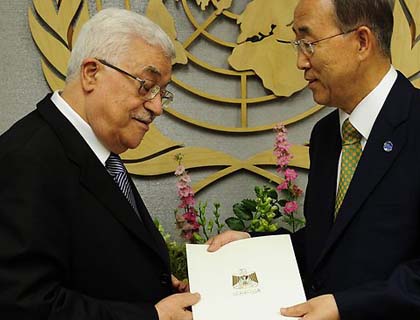On Friday, Sept. 23, Palestinian president, Mahmoud Abbas, addressed the 66th United Nations General Assembly after he gave the application to UN General Secretary, Ban Ki Moon for recognition of an independent State of Palestine. His speech was erupted twice as participants were clapping and gave him standing ovation.
He talked rightfully and reasonably about reconciliatory position of Palestine during peace talks between two countries. He alleged that Palestinians have always been ready to talk and solve problems through peaceful means, but it was Israel that consistently brought peace negotiation into blunt failed attempts.
Efforts to submit the application to bid for an independent state has long been put into discussion among officials and think-tanks across the globe. The notion was declared after the failure of peace efforts actually energized by promising addresses and promises of President Obama.
Right after holding the presidential office, President Obama made his historic address in Egypt where he talked about fundamental change in US foreign policy and new bilateral-interest-based relationship with Islamic world, which had deteriorated during former President Bush.
To ameliorate the relationship, what President Obama had to offer to Islamic world which also had the potential to change the consistent suspicion of common Muslims was focusing on the Middle East Crisis.
He actually was decided and resolved to change the momentum and lobby Israel to reach an agreement with Palestine on the basis of two-state solution theory. From the very start, he made big steps which were all promising for Palestinians as well as for Muslim countries.
In his first address in Egypt, he vividly said that condition of Palestine was unbearable and it crisis should come to an end.
He also, in contrast to his former fellows, clearly emphasized on the righteousness of Palestine and vividly talked about pre 1967 border line, which was of course a turning point in decades-long history of Middle East crisis.
Seemingly, he turned out to have weighed himself too heavy without ground realities of American politics, which has been starkly bipartisan over the issue of Israel. His assumption was based on false calculation as he was thinking that Israel was as eager as Palestine to reach into a peace agreement.
His sincere efforts could lead Israel to reassess its position and start serious peace talk with Palestinian counterparts. Last year, he used to talk with full confidence in the same United Nations General Assembly, hoping next year there was a separate Palestine state.
He did really a lot to push for the success of the process, but bluntly failed. With mediation of US, peace talks started between two countries, and initial signs were denoting about possible success of the talks. But Israel obstinately and inflexibly stood against it through building illegal settlements on the Palestinian territory.
President Mahmoud Abbas also stood hard and said that without withholding the illegal settlement by Israel, he would leave the round table as he did.
However, President Obama tried to stop Israel of settlement building, but nothing changed. Israel continued building illegal settlements during peace talks, which eventually led to its failure.
Last year, when president Obama was talking about the prospective of Middle East Crisis, he had much hope that Israel and Palestine can agree on the notion of two-state solution.
But his efforts were obviously challenged and President Obama ostensibly turned back to reality of bi-partisan American politics.
In his speech few days ago, he somehow justified reasonably his last year speech at United National General Assembly. He said that he did not mean actually a separate state for Palestine through United Nations, but through talks with Israel to solve challenge and problems that weakened the prospective of resolving Middle East Crisis.
Prior to start of UN general assembly meeting, president Mahmoud Abbas and President Obama discussed the bid. Mr. Obama warned that the US would veto the effort of Palestine for separate State, instead he advised to restart discussion and solve their problems. But seemingly Palestinian President didn't fear of veto, and he presented the application and it will be voted by members.
But to receive members of United Nations, it should also be passed through United Nations Security Council, where five countries hold the veto right——USA, Britain, France, Russia and China. But before, it should acquire the majorities' vote in the United Nations General Assembly.
However, there are strong assumptions that it will gain majorities positive vote, but meanwhile, Israel and United States are trying to bar it through lobbying countries to cast neutral vote.
In the case, if it acquires majorities' vote, then there remains no option ahead of President Obama, except to veto it. If the US forced to veto, then its general image would be damaged across the globe, particularly, in Muslim countries.
Such incident is definitely against the political interest of the country and affect it's currently somehow warm relation with Arab countries. There is no more Hosni Mubarak to support US policy in the region. Now the momentum turned to common civilians who generally find Israel's policy violent and disgraceful. Anti-Israel demonstration has increased and people pressurize government to reassess previous policies.
Rigidity of Israel against settlement building is now proving costly for both countries. Seemingly, choices are becoming less and lesser and the US has to take sharp steps. On one hand, it cannot leave Israel as Tele Aviv enjoys consistent support from circles within and out of Obama's administration.
On the other hand, relation is at stake with Arab countries, now ruled by elected leaders through very democratic means that US has always been supporting. Here would not be any more "dictatorship against democracy, but democracy against democracy". Anyhow, considering all repercussions, U.S. and Israel try to lobby countries and ban the application passing through General Assembly. But, whether they succeed is a bit early to answer.

